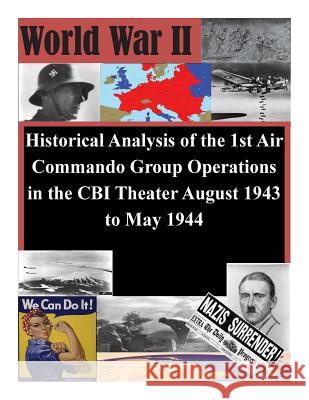Historical Analysis of the 1st Air Commando Group Operations in the CBI Theater August 1943 to May 1944 » książka
Historical Analysis of the 1st Air Commando Group Operations in the CBI Theater August 1943 to May 1944
ISBN-13: 9781505377835 / Angielski / Miękka / 2014 / 54 str.
Historical Analysis of the 1st Air Commando Group Operations in the CBI Theater August 1943 to May 1944
ISBN-13: 9781505377835 / Angielski / Miękka / 2014 / 54 str.
(netto: 57,14 VAT: 5%)
Najniższa cena z 30 dni: 60,00
ok. 16-18 dni roboczych
Bez gwarancji dostawy przed świętami
Darmowa dostawa!
This book conducts an analysis of the 1st Air Commando Group (ACG) and its operations in the China-Burma-India (CBI) theater from August 1943 to May 1944. History lends credence to the fact that this small unorthodox group of airmen, envisioned from the simple idea of "what if" and fashioned in a mere few months time into a cohesive and viable fighting force, breathed life into the stagnant Allied effort of removing the Japanese from the China-Burma-India theater. The question is, how? How could such a small unit, which was forced upon the traditional military structure in the CBI theater, accomplish the seemingly impossible where others before had failed? The author maintains that the success of the 1st Air Commando Group was the result of key factors which when combined formed a "magic elixir" boosting the ailing Allied effort in this theater. Those key factors were strong leadership, efficient organization including the hiring of the "right" people, unit training, joint training to promote teamwork, and, tactics and innovation. This analysis gathered supporting information from primary source documents stored at the USAF Historical Research Agency (USAFHRA) as well as utilizing secondary sources for background information. This book looks at the 1st Air Commando Group from August 1943 through May 1944. It begins with a discussion of the events which gave rise to the need for the Air Commandos. Following is a discussion of the organization of the unit, deployment, preparations in-theater, and Operation THURSDAY -the aerial invasion of Burma. Analysis of the reasons for success follows next. Finally, the book closes with final thoughts on the 1st Air Commando Group and lessons learned. The unit was broken apart following its successes through May 1944, never to fight again as an independent cohesive organization. The author surmises that the key ingredients to the "magic elixir" success of this fighting force were no longer present. Without those key factors, the unit was not to be. If it could be narrowed down to a single factor, the underlying key to the success of the Air Commandos was the effective leadership of individuals like General H. H. Arnold, Colonel Philip Cochran, Colonel John Alison, British Brigadier General Orde C. Wingate, and British Admiral Mountbatten. The strength of character and conviction of these individuals enabled an unorthodox organization to be superimposed on an orthodox system and make it work. Finally, many of the ways in which the military operates today-emphasis on joint doctrine, the establishment of US Special Operations Command, and the like-find their roots in the organization and operations of the First Air Commandos. The military was deaf to the Air Commando "lessons learned" for many years. It is ironic that the services have come full circle and now endorse many of their procedures in formalized doctrine.
Zawartość książki może nie spełniać oczekiwań – reklamacje nie obejmują treści, która mogła nie być redakcyjnie ani merytorycznie opracowana.











